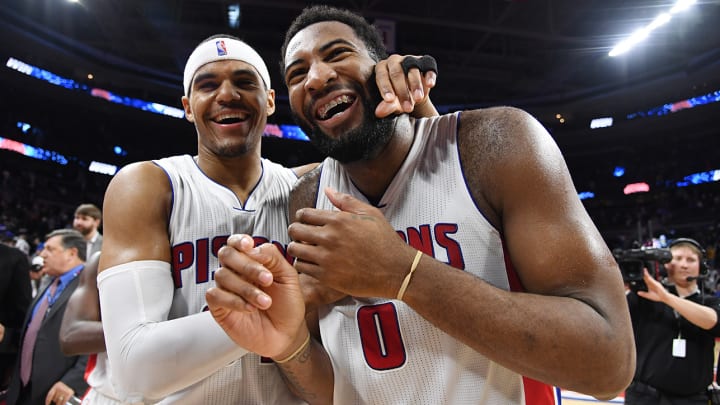The Pistons Are Making the Most of a Clean Slate

The hope that comes with a new NBA season is not reserved for freshly formed superteams and prospect-laden upstarts alone. Most every franchise enjoys the renewed possibility of a clean slate. A 0–0 record is a chance to make good on all that went wrong, to correct a course fraught with injury and ego and self-destructive habits. It doesn’t take a blockbuster deal for a team to figure itself out—only the clarity of hindsight and the subtler means to do better.
It’s here that we find the Pistons, winners of five of their first seven games. Most recently, they clubbed the Timberwolves, locked down the Clippers, and outlasted the Warriors. The contrast of that last matchup was particularly revelatory. On one side, the defending champions eased their way through defensive possessions and threw the ball around casually. On the other, Detroit committed to the hard work of denying Golden State’s best scorers while valuing its every opportunity. This is a team that puts a premium on possession. Without a superstar around to elevate a given sequence, the Pistons are resolved to give themselves as many swings as possible at getting everything right.
The Warriors Are Sweating out Their Championship Hangover
This is how the Pistons, who rank 22nd in the league in pace, can attempt as many field goals per game as the Nets, who rank first. There is no greater shot disparity in the league right now than that between Detroit and its opponent. The Pistons take roughly 12 more shots per game than whatever team they’re playing against, forcibly stretching their efficiency beyond its otherwise modest limits. Turnovers are kept to an absolute minimum, beginning with the low-risk passing profile of Reggie Jackson. Those shots that do go up are often rebounded for second chances, courtesy of Andre Drummond. Then, Detroit leans into passing lanes on defense and jumps anything that floats. Leave a pass exposed and Avery Bradley will find a way to get a hand on it.
This overall pattern is consistent with the team’s performance last year, which makes sense considering how many holdovers are on the roster. Bradley was Detroit’s most—and only—significant addition. So far, he’s giving the Pistons exactly what they need: spot-on execution, tighter perimeter defense, and superior shot-making.
A year ago, Detroit was reliant on the flighty shooting of Marcus Morris and Kentavious Caldwell-Pope. Their cold stretches may have taken years off of Stan Van Gundy’s life. Now, those spot-up jumpers are funneled through Bradley (46.4% from three), Tobias Harris (46.3%), and newcomer Langston Galloway (47.8%), punching up the value of all those extra possessions.
Even while running a similar offense, the Pistons look like a completely different team. Detroit’s attempts last season to branch out from what had been a pick-and-roll-heavy offense died on the vine. There wasn’t enough shooting or ball-handling for those plays to actually develop, forcing awkward improvisations. Clearer preparation and slight changes in personnel have worked wonders. Harris, in particular, looks entirely more comfortable in his role balancing off-the-dribble creation with spot shooting. Drummond looks more game than ever for putting the ball on the floor for short burst drives. There’s still plenty of conventional pick-and-roll in Detroit’s offensive portfolio, but the larger system has been diversified. Something as simple as a dribble hand-off between Drummond and Bradley can prevent a defense from loading up against the same predictable outcomes. The result looks like a happy middle ground.
Considering how much grumbling came out of Detroit last season, “happy” would be quite the accomplishment. We cannot gloss over the difference in collective focus, a change that goes well beyond adding Bradley. These new and improved Pistons now come with 40% less angst. They’re lighter on passive-aggressive glances and exasperated response. Every possession isn’t weighed down by the baggage of a floundering season, which gives the entire operation more room to breathe. Drummond isn’t perfect—especially on defense. Jackson has his faults and has fallen into a role very much different from the one he signed up for. Still, so much of the frustration with the Pistons last year came from their failure to meet even modest expectations. That team submarined itself to 37 wins under the bulk of its own malaise.
The Magic Finally Give Aaron Gordon a Little Space
Detroit has earned no benefit of the doubt when it comes to withstanding adversity. To go 5–2—and see all their good habits rewarded—is a spoon full of sugar. We won’t know whether the Pistons have really turned a corner until they’re tested by the sorts of problems that led to last season’s disquiet. One reason for hope: the Pistons are doing everything possible to give themselves a chance. Jackson, who so often sits at the eye of the storm, is buying in by accommodating the other scorers on the roster. Drummond and Harris are trying new things and bringing attention to detail. The bench is solid. The baseline effort level has been impressive. Seven games is such a long, long way from 82, but the way Detroit is playing suggests progress beyond the results. This could be the start of something, if the Pistons let it.

Rob Mahoney is an NBA writer dedicated to the minutiae of the game of basketball, its overarching themes and everything in between. He joined the Sports Illustrated staff in 2012.